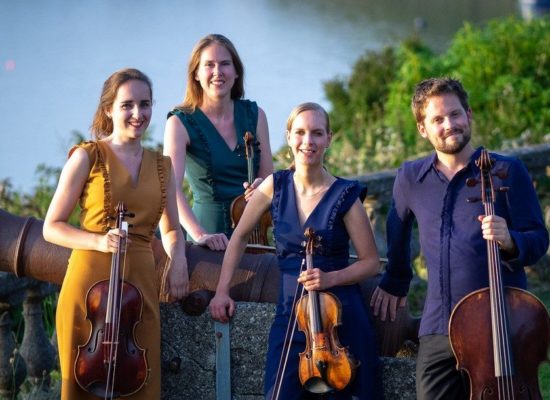Friday 26 June 2020
7:00 pm

This specially filmed concert will become available to view here at 7pm on Friday 26th June 2020. The link will be shared on our social media, or you can check-in to this event page to watch it here.
If the concert is not immediately visible at that time, please refresh this page and/or clear your cache.
If you would like to make a donation towards the cost of these performances, please click on the Donate button below. All donations will go directly to the musicians.
Our first concert comes from Studio 150 at the Bethlehemkerk in Amsterdam, where the team has been actively producing live streamed concerts throughout the pandemic. Dudok Quartet also took the view that music is essential work and kept rehearsing for the duration, so were in a position to offer us a substantial programme to open our virtual festival.
When it comes to string quartets Haydn is the oldest kid on the block and Caroline Shaw is one of the youngest. By general consensus Haydn’s six Opus 20 quartets are where the string quartet came of age. Not so many years ago the only Haydn quartets we heard would have been the flashy later ones he wrote for his London trips, the earlier quartets were just for the specialists. Now there is a legion of brilliant young Quartets all searching for new or different repertoire including the rediscovery of old masters. The great art of string quartet playing is going through a golden period and we are blessed with Quartets willing to explore the repertoire.
Caroline Shaw is a multi-tasking musician, singer, composer, producer and violist, who won a Pulitzer for her remarkable Partita for 8 Voices. Her Entr’acte was inspired by a Haydn quartet, music she describes as taking you to the other side of Alice’s looking glass. Her Valencia must be the first quartet written to celebrate an orange.
Beethoven’s B flat quartet is special in an unusual way. Its six movement format harks back to the divertimentos of his youth and he seems to have gone out of his way to make this quartet more than usually accessible, that is, until he presents us with the stupendous finale. It seems Beethoven made no outline plans for this quartet and the unusual number of movements were the result of him trying to work his way around compositional problems as they arose, which he partly resolved by resurrecting discarded material from previous works. The final result gives the impression of someone who has lost the path and is struggling to find it again with many diversions along the way. With Beethoven being such a strong personality, the diversions are intriguing to say the least – the opening Adagio/Allegro a long struggle between two completely different paths; the tiny Scherzo tries a high speed approach, speedily rejected; the Andante’s graceful dance goes back in time to the bittersweet divertimenti of the previous century; another dance follows, more modern and popular but almost as gracious; then the famous Cavatina, deeply serious, unbearably beautiful. And so, finally, the goal is reached, well described as the maddest fugue in Western music, several hundred years ahead of its time, music for a later age as Beethoven himself said to one of his despairing performers. It all ends in a blaze of light, but what a journey.
| Composer | Work |
|---|---|
| Haydn | String Quartet in A major Op.20/6 |
| Caroline Shaw | Valencia |
| Caroline Shaw | Entr'acte |
| Beethoven | String Quartet No.13 in B flat Op.130/133 |
Copyright © 2025 West Cork Music. All rights reserved.
Designed and developed by Matrix Internet